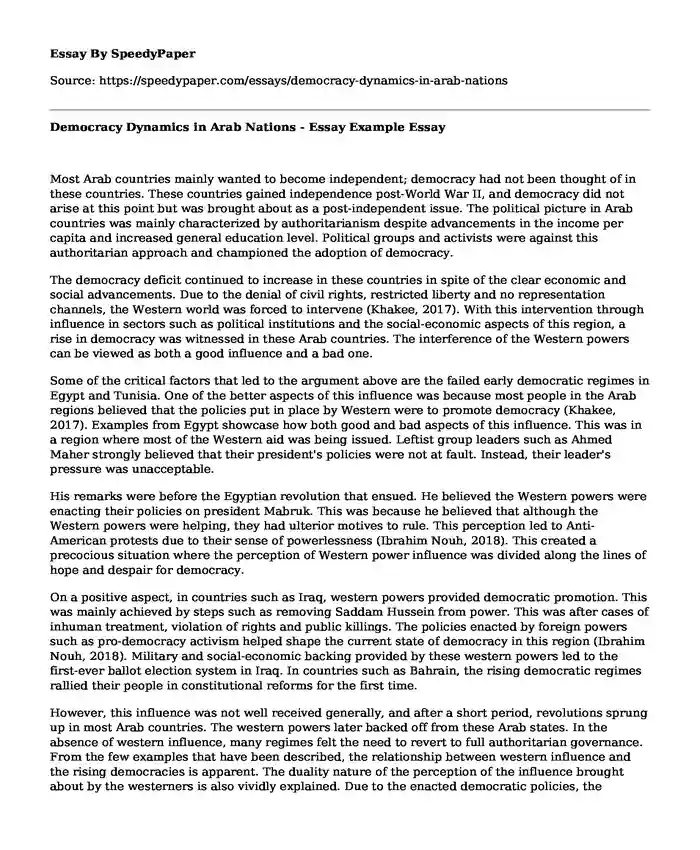Most Arab countries mainly wanted to become independent; democracy had not been thought of in these countries. These countries gained independence post-World War II, and democracy did not arise at this point but was brought about as a post-independent issue. The political picture in Arab countries was mainly characterized by authoritarianism despite advancements in the income per capita and increased general education level. Political groups and activists were against this authoritarian approach and championed the adoption of democracy.
The democracy deficit continued to increase in these countries in spite of the clear economic and social advancements. Due to the denial of civil rights, restricted liberty and no representation channels, the Western world was forced to intervene (Khakee, 2017). With this intervention through influence in sectors such as political institutions and the social-economic aspects of this region, a rise in democracy was witnessed in these Arab countries. The interference of the Western powers can be viewed as both a good influence and a bad one.
Some of the critical factors that led to the argument above are the failed early democratic regimes in Egypt and Tunisia. One of the better aspects of this influence was because most people in the Arab regions believed that the policies put in place by Western were to promote democracy (Khakee, 2017). Examples from Egypt showcase how both good and bad aspects of this influence. This was in a region where most of the Western aid was being issued. Leftist group leaders such as Ahmed Maher strongly believed that their president's policies were not at fault. Instead, their leader's pressure was unacceptable.
His remarks were before the Egyptian revolution that ensued. He believed the Western powers were enacting their policies on president Mabruk. This was because he believed that although the Western powers were helping, they had ulterior motives to rule. This perception led to Anti-American protests due to their sense of powerlessness (Ibrahim Nouh, 2018). This created a precocious situation where the perception of Western power influence was divided along the lines of hope and despair for democracy.
On a positive aspect, in countries such as Iraq, western powers provided democratic promotion. This was mainly achieved by steps such as removing Saddam Hussein from power. This was after cases of inhuman treatment, violation of rights and public killings. The policies enacted by foreign powers such as pro-democracy activism helped shape the current state of democracy in this region (Ibrahim Nouh, 2018). Military and social-economic backing provided by these western powers led to the first-ever ballot election system in Iraq. In countries such as Bahrain, the rising democratic regimes rallied their people in constitutional reforms for the first time.
However, this influence was not well received generally, and after a short period, revolutions sprung up in most Arab countries. The western powers later backed off from these Arab states. In the absence of western influence, many regimes felt the need to revert to full authoritarian governance. From the few examples that have been described, the relationship between western influence and the rising democracies is apparent. The duality nature of the perception of the influence brought about by the westerners is also vividly explained. Due to the enacted democratic policies, the general democratic landscape in most Arab countries was formed.
References
Ibrahim Nouh, I. (2018). The Political and Social Influences of the West 'Us' in the Arab World' Others.' Asian Journal of Middle Eastern and Islamic Studies, 12(2), 257-272. https://www.tandfonline.com/doi/abs/10.1080/25765949.2018.1485893
Khakee, A. (2017). Democracy aid or autocracy aid? Unintended effects of democracy assistance in Morocco. The Journal of North African Studies, 22(2), 238-258. https://www.tandfonline.com/doi/abs/10.1080/13629387.2017.1279971
Cite this page
Democracy Dynamics in Arab Nations - Essay Example. (2024, Jan 30). Retrieved from https://speedypaper.net/essays/democracy-dynamics-in-arab-nations
Request Removal
If you are the original author of this essay and no longer wish to have it published on the SpeedyPaper website, please click below to request its removal:
- Free Essay on Globalization and International Trade
- Role of Germany on BMW Group - Essay Example
- Harnessing the Best of Globalization - Essay Sample with the Article Review
- Manly Beach - Free Essay Sample on Tourism
- Free Essay Claiming that Living in A War Zone Is Better than Living at Home
- Crime in Jamaica. Paper Example
- Essay Sample on Why People Should Be Against Globalization
Popular categories





